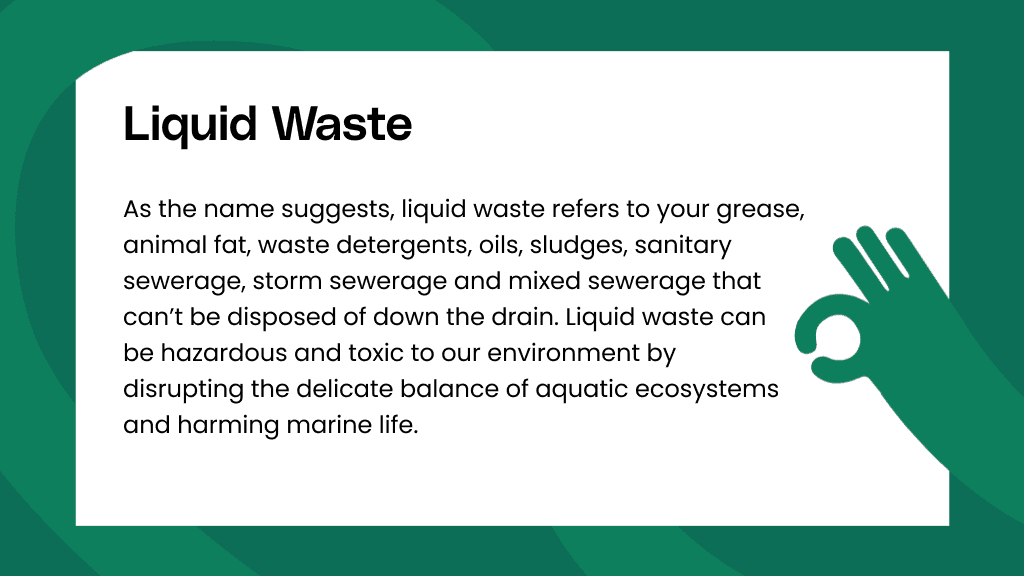About Reclaim Waste

Stormwater drains pipes take big amounts of water from roofs, buildings, land and led areas after rain. Linking bathrooms and other domestic waste drains to stormwater drains might result in wastewater moving down open seamless gutters.
Never ever place hazardous substances down sinks, toilets or stormwater drains Materials consisting of petrol, grease, oil, chemicals and herbicides, and solvents such as paint pole dancers need to not be put down sinks, bathrooms or stormwater drains. These substances are hard to get rid of in the sewage therapy process and cause contamination problems in our neighborhood rivers.

Use eco-friendly and phosphate-free cleaning agents or soap Cleaning agents that are phosphate free include fewer nutrients to the sewage system. Read and contrast detergent and washing powder tags at the grocery store, and select items that are extra eco pleasant. Utilize pure soap or soap flakes for cleaning or try natural items such as borax, vinegar and antique arm joint oil for cleansing.
Although fluid waste is a term that covers a wide range of products, there's a great factor why leaving its disposal to the specialists is recommended. Fluid waste is non-solid product that has no further usage and should be treated and dealt with according to neighborhood, state and government laws.
The Definitive Guide to Reclaim Waste
Although instances of fluid waste can consist of wastewater, fats, oils or grease, made use of oil, fluids, solids, gases or sludges and hazardous family fluids, there are some that are considered to be much more unsafe than others when it concerns the setting and the health of pets and humans alike. It's for this factor that each state and area have actually rigorous guidelines linked to liquid waste administration.
Fluid waste can be kept in holding tanks or packaged in drums, intermediate bulk containers or approved tiny containers prior to either being dealt with or removed using outsourced vacuum trucks. Offered the nature of the products, liquid waste can not go in the basic waste stream and there are rigorous guidelines on just how to throw away it correctly.
Relying on a decision of the degree of danger, it may be essential to remediate those sites. Furthermore, dangerous fluid chemical wastes are regulated waste and should be tracked according to the state waste regulations. Under the chain of custody and duties, proprietors are responsible and responsible for waste produced by a service.
One of the core applications for superabsorbent polymers (SAPs) is fluid waste solidification. liquid waste removal. SAPs are made use of by waste management professionals to stop potentially dangerous fluids from getting in waterways, groundwater aquifers, and other sensitive atmospheres. Since liquids can quickly transfer impurities right into ecological receptors and possibly add to geotechnical failures, liquid wastes are virtually always prohibited from disposal in land fills
Some Known Incorrect Statements About Reclaim Waste
Basically, cost-free liquids are fluids that divide from the strong portion of waste material. Fluid waste can include the following: HDD mud and cuttings Landfill leachate Wastewater therapy sludge & biosolids Dredged sediments Oil and gas drill cuttings Working out fish pond muck Hydro Excavation slurry Coal combustion residuals/ash Tank base sludge Concrete grinding/polishing slurry Related Article: For a sensible example of cost-free liquids separating from waste material, consider the complying with situation: A waste management service provider lots a dump associate sludge from a wastewater treatment plant's oygenation container, throughout a routine upkeep occasion.
Nonetheless, when the vehicle driver gets to the garbage dump, he notifications water leaching from the sludge and putting from the dump truck. The lots was turned down by the garbage dump and the driver was required to dispose of the waste as a liquid waste at an unique center, which boosted the disposal costs tremendously.
We also need to be accountable for the correct disposal of our waste materials. It is not enough that we pay waste disposal companies to take care of our rubbish.
The Only Guide for Reclaim Waste

Segregating your waste can begin inside the home. Set apart dry and fluid waste as well as edible waste, eco-friendly and non-biodegradable products.
Layer the base with dirt to soak up the damp waste. Layer the garden compost with damp and completely dry waste as well as dirt to preserve an equilibrium in between the wet and the completely dry.
All about Reclaim Waste
To promote faster decomposition, you can likewise add semi composted soil to the garden compost. If you see the odor is coming to be also strong, include extra papers and paper waste or include even more holes to explanation the compost bin to maintain the equilibrium of the waste materials.
We likewise need to be liable for the appropriate disposal of our waste materials. It is not enough that we pay waste disposal business to take care of our rubbish.
Our waste, our responsibility. Have you ever before wondered what takes place to your fluid waste after it's collected? Did you recognize that liquid waste can be recycled?
See This Report about Reclaim Waste
The dreamland is a good outside area with lots of sunlight and air. Segregate your waste. Segregating your waste can begin inside the home. Set apart completely dry and liquid waste as well as edible waste, biodegradable and non-biodegradable materials. Always maintain the cover on your containers to avoid bugs, worms, flies, and undesirable smells.
Layer the bottom with dirt to soak up the wet waste - liquid waste disposal. Layer the compost with damp and completely dry waste as well as soil to keep a balance in between the wet and the completely dry.
To assist in faster disintegration, you can likewise include semi composted soil to the garden compost. If you see the smell is coming to be as well solid, include additional papers and paper waste or add even more holes to the garden compost container to maintain the balance of the waste materials.
Comments on “Little Known Facts About Reclaim Waste.”